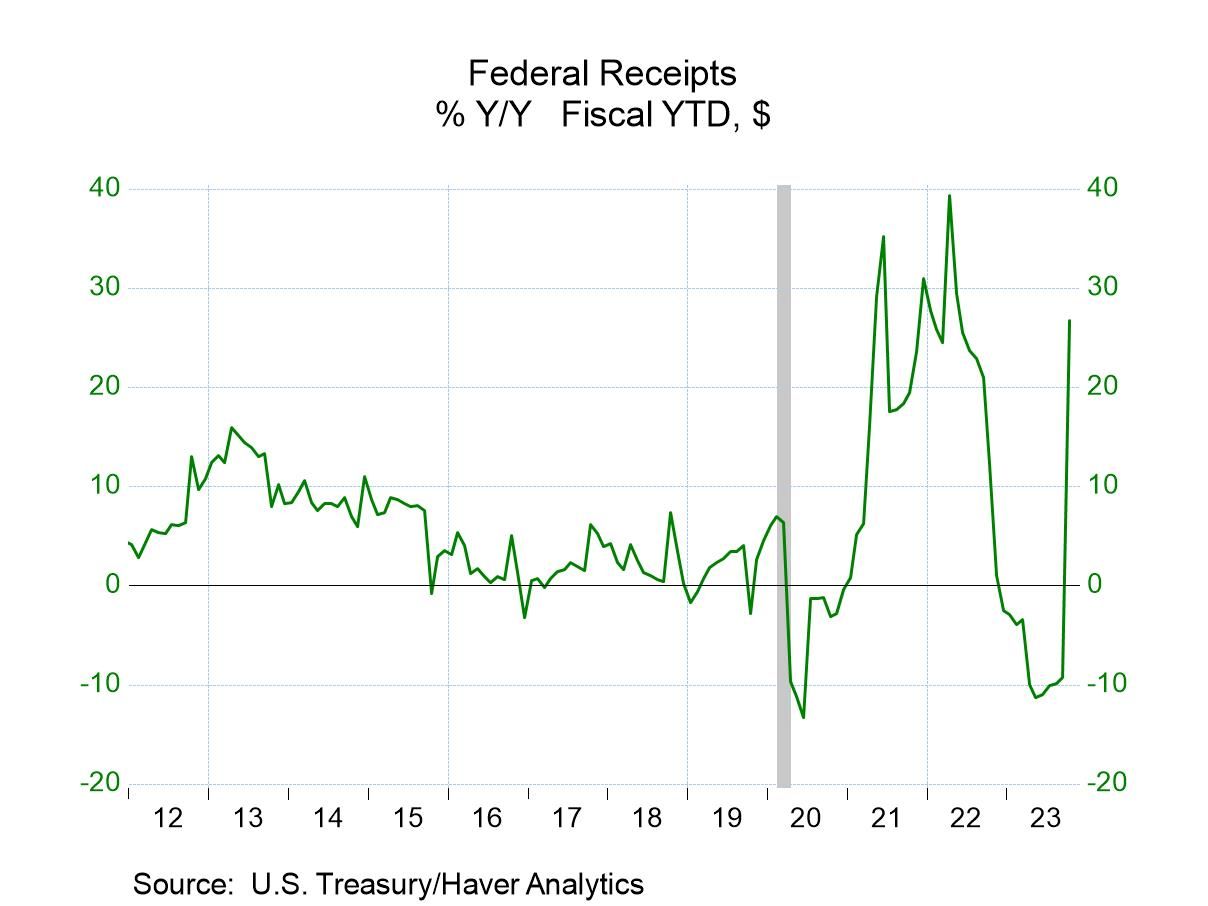U.S. Gov’t Budget Deficit Narrows to Start FY’24
by:Tom Moeller
|in:Economy in Brief
Summary
-
Smaller monthly deficit follows deepening during FY’23.
-
Revenues rise y/y as individual & corporate tax receipts strengthen.
-
Outlay growth resumes with broad-based increases


The U.S. Treasury Department reported that the U.S. government budget ran a $66.6 billion deficit to start the current fiscal year following a deficit of $87.9 billion in October 2023. This follows the deficit’s deepening to $1.70 trillion during FY’23 from $1.38 trillion in FY’22. The Action Economics Forecast Survey expected a $17.0 billion October surplus.
Overall revenues increased 26.7% y/y during October after a 9.3% decline in FY’23 as individual income tax receipts rose 25.4% y/y after declining 17.3% last fiscal year. The level of corporate tax receipts more than tripled versus last October after a 1.2% decline last fiscal year. Social insurance revenues improved 5.7% y/y after an 8.8% increase and excise taxes rose 25.0% y/y following a 13.6% decline. Customs duties fell 15.4% y/y after a 19.6% FY’23 shortfall.
Federal government outlays increased 15.7% y/y last month after falling 2.2% last year. Medicare payments increased 25.5% y/y following a 12.2% rise while Social Security outlays rose 12.3% after an 11.1% rise last year. Defense spending rose 14.2% following a 7.0% FY’23 rise. Interest payments strengthened 76.7% y/y after rising 38.7% in FY’23. Offsetting these increases, income security outlays fell 22.2% y/y during October following a 10.6% decline in FY’23 and health program spending was little changed y/y following a 2.8% decline last fiscal year.
Haver's data on Federal Government receipts & outlays are contained in USECON. The expectations figure is in the AS1REPNA database.


Tom Moeller
AuthorMore in Author Profile »Prior to joining Haver Analytics in 2000, Mr. Moeller worked as the Economist at Chancellor Capital Management from 1985 to 1999. There, he developed comprehensive economic forecasts and interpreted economic data for equity and fixed income portfolio managers. Also at Chancellor, Mr. Moeller worked as an equity analyst and was responsible for researching and rating companies in the economically sensitive automobile and housing industries for investment in Chancellor’s equity portfolio. Prior to joining Chancellor, Mr. Moeller was an Economist at Citibank from 1979 to 1984. He also analyzed pricing behavior in the metals industry for the Council on Wage and Price Stability in Washington, D.C. In 1999, Mr. Moeller received the award for most accurate forecast from the Forecasters' Club of New York. From 1990 to 1992 he was President of the New York Association for Business Economists. Mr. Moeller earned an M.B.A. in Finance from Fordham University, where he graduated in 1987. He holds a Bachelor of Arts in Economics from George Washington University.




 Global
Global

